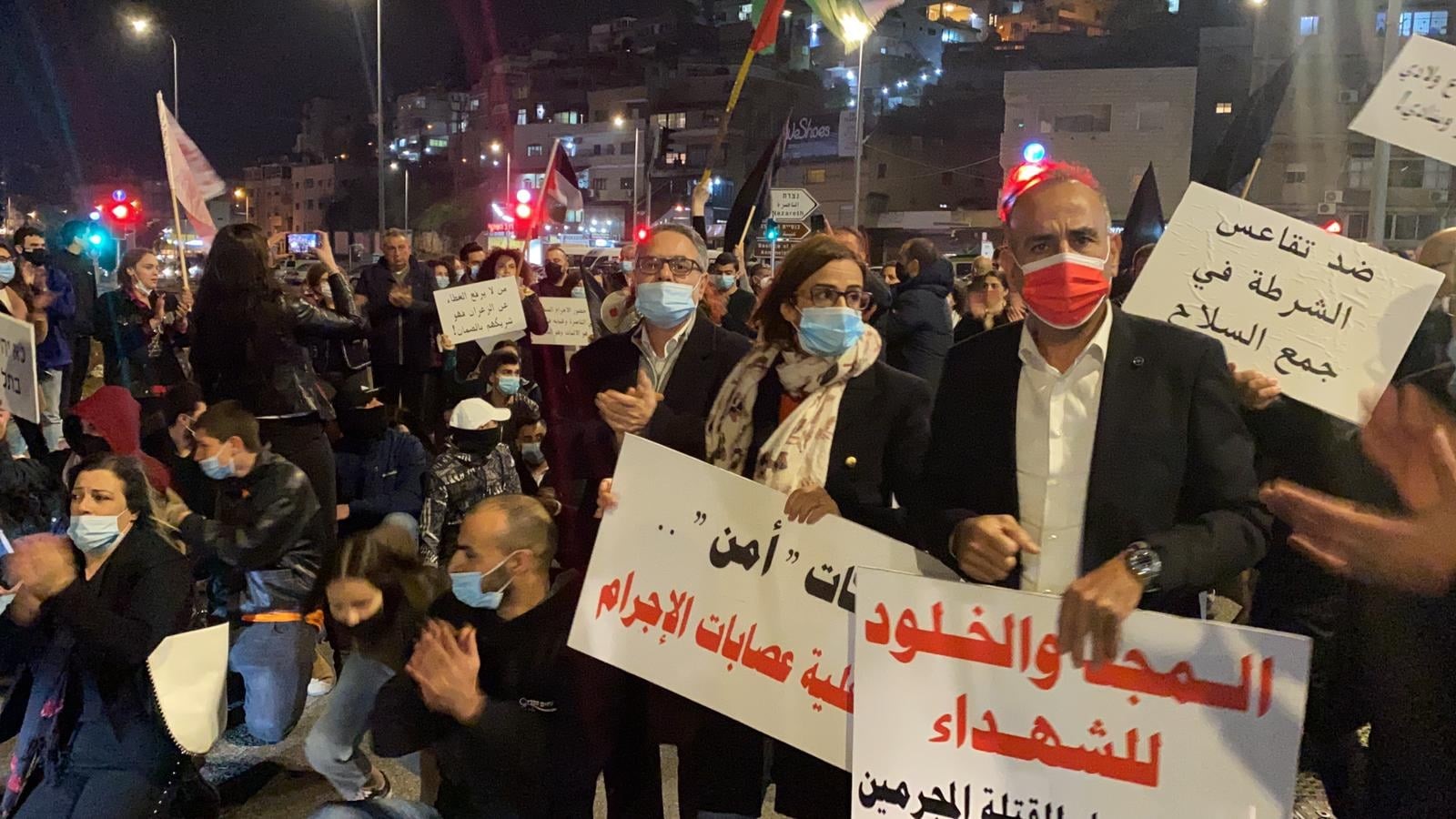More than ten thousand Arab-Palestinian citizens of Israel took part in a march in the city of Tamra in the Galilee on Saturday afternoon, February 6, to protest the escalating violence and crime in the country’s Arab communities and the ostensible helplessness of the government and police in combating the scourge.
Tamra became the venue of a previously planned protest for Saturday after the police killing there of Ahmad Hejazi, a resident of the city on Tuesday, February 2. Hejazi, a 22-year-old nursing student, was shot during a gun battle between police and suspected criminals. According to police, two gunmen armed with automatic M-4 rifles were firing on a house when officers who had been lying in wait for the pair, apparently in a pre-planned ambush, opened fire. Hejazi, who came out of his house when he heard gunfire — reportedly to provide medical assistance — was shot and killed. A doctor — who also apparently came to assist — was wounded. Hejazi’s death immediately ignited protests in Arab towns across the country.

Hundreds block the entrance to Nazareth on Friday night, February 5, 2021. First from right: Hadash secretary, Mansour Dahamshe; next to him are two Joint List MKs from Balad: Heba Yazbak and Mtanes Shehadah; among the placards: “Glory and eternity to the martyrs”; “Against police inaction in collecting arms.” (Photo: Al-Ittihad)
Thousands of Arab-Palestinians citizens took part in smaller rallies also held on Saturday in many cities and towns to express their fury over police complicity and collaboration with outlaws, who have killed 12 people thus far this year across Arab communities. Demonstrations took to the streets of Haifa, Um Al Fahem, Taybeh, Nazareth, Shafa’mr, Baqa Al Gharbiyye, and Nahaf.
A day earlier, on Friday, a rally in Umm al-Fahm saw hundreds of protesters demonstrating outside the Israeli Police station in the city and chanting slogans that condemned the police for their involvement in the crime wave. The protesters chanted “Police out!” and demanded action against violence and criminality in Arab-majority areas of Israel. The protest began near the city hall, moved to the local police station, then to the city entrance and main highway, the Zo Haderech news site reported. Joint List MK Youssef Jabareen (Hadash), who lives in the city and participated in the protest said, “We demand that the police and government stop talking and start doing… The days are ticking by and the victims are piling up. The authorities have abandoned us to our fate, to drown in the blood of our children and in a sea of illegal weapons.”
On Friday night, night hundreds blocked the entrance of Nazareth, among them Hadash secretary, Mansour Dahamshe, Joint List MKs Aida Touma-Sliman, Matanis Shahade and Heba Yazbak. Another smaller protest in the central city of Tayibe saw protesters blocking a main road outside the city with burning tires. Seven people were arrested during clashes with police.
Barakeh Clarifies the Context of the Phenomenon
The crowds in Tamra rallied on Saturday afternoon at the Clock Square in the city, marched towards adjacent Route 70, and blocked it to traffic in both directions. Among the protesters were mayors of Arab communities, Hadash and Joint List MKs, activists at the Histadrut union and representatives of the civil society. Among the speakers at the protest was former Hadash MK Mohammed Barakeh, today the head of the High Follow-Up Committee for Arab citizens of Israel and a senior member of the Communist Party of Israel. Barakeh told the crowd:
“The escalation of violence and crime is not a defect in the Israeli administration, it is not a mistake. Rather, this is a political project that the Israeli ruling establishment has put in place, and has allowed criminal gangs to operate freely and has pumped weapons to them, not for the sake of killing so-and-so, but in order for ours to be a disjointed society, full of anxiety. We are possessed by the fear that runs through the hearts of mothers, who fear that when her son leaves the house, he will not return. They want to distract us from basic fundamental issues that fall into the core of Israeli policy. They want to get us out of the battle, the struggle, for our land and our homes.”
Barakeh went on to warn those gathered that “the so-called ‘governmental plan to confront crime,’ introduced by Prime Minister Benjamin Netayhahu on Wednesday, February 3, is in fact “a plan of domestication.” “Whoever wants to truly confront violence and crime,” Barakeh said, “let him issue orders to the police, and within three to six months this phenomenon will be eliminated. They know the criminals one by one; and they know each weapon, where it comes from and where it is today; they know all the details, large and small. So if they really wanted to eliminate the phenomenon, they could do so.”
In recent weeks, Netanyahu has been meeting with dozens of Arab mayors as part of a new electoral campaign in Arab communities. The prime minister said that his interlocutors had consistently demanded the appointment of someone to lead the fight. On Wednesday night, Netanyahu announced that retired senior police official Aharon Franko would serve as a czar for violence in Arab communities.
Barakeh continued, “So we reject the [governmental] plan, and the person who installed [Franko],” namely Netanyahu, “is responsible for the plan; [Franko] is only a military governor. And if they believe that our people are prepared to return to the days of military rule, under the pretext of confronting crime, I tell them: if there is a need for an uprising to confront crime, then it should be a popular uprising [intifada]; and if there is a need for an uprising to maintain security and safety in our homes and in our towns, then it should be a popular uprising.”
Related: Posts on crime and violence in Israel’s Arab communities


